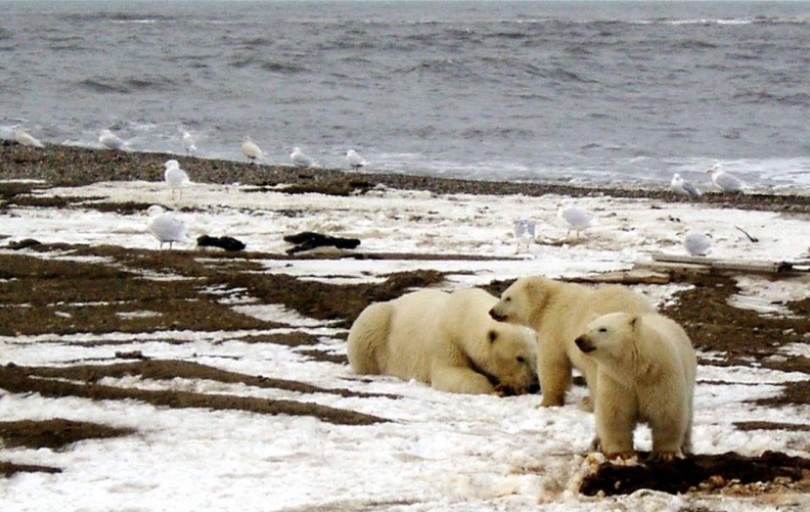US to cancel Alaska oil, gas leases issued under Trump
By Jarrett Renshaw and Nichola Groom

A polar bear sow and two cubs are seen on the Beaufort Sea coast in this undated handout photo provided by the U.S. Fish and Wildlife Service Alaska Image Library on December 21, 2005. U.S. Fish and Wildlife Service/Handout
The U.S. Interior Department on Wednesday said it would cancel oil and gas leases in a federal wildlife refuge that were bought by an Alaska state development agency in the final days of former President Donald Trump’s term.
President Joe Biden, a Democrat, has pledged to protect the 19.6 million-acre (7.9 million-hectare) Arctic National Wildlife Refuge (ANWR) for polar bears and caribou.
“As the climate crisis warms the Arctic more than twice as fast as the rest of the world, we have a responsibility to protect this treasured region for all ages,” he said in a statement.
Trump’s Republican administration had issued the Alaska Industrial Development and Export Authority (AIDEA) seven leases a day before Biden’s inauguration.
Environmentalists praised the decision but it was lambasted by a Republican Senator from Alaska, where officials have sought to open up drilling in the reserve to secure jobs and revenues for the state.
The government also said it would forbid new leasing on more than 10 million acres in the National Petroleum Reserve in Alaska, a 23 million-acre area on the state’s North Slope that is the largest undisturbed public land in the United States.
The actions are the latest effort by Biden to rein in oil and gas activities on public lands, part of a broader agenda to combat climate change.
Biden, who is gearing up to run for re-election in 2024, possibly against Trump, also faces pressure to boost domestic fuel supplies to keep pump prices low. Earlier this year, the government approved a $7 billion ConocoPhillips drilling project in Alaska that drew criticism from the United Nations, which has urged member countries to accelerate the transition away from fossil fuels.
AIDEA said it would challenge the cancellation of the leases in court.
“This latest action by the Department of the Interior shows arbitrary disregard for Federal law, based on campaign trail rhetoric,” AIDEA said in a statement. “Campaign promises are not enough to justify this agency action.”
The Interior Department said a new environmental review had determined that the analysis that underlies the agency’s 2021 lease sale was “seriously flawed,” giving Secretary Deb Haaland authority to cancel the leases.
FRUSTRATION IN ALASKA
Trump’s Interior Department in January 2021 sold leases in ANWR over the objections of environmentalists and indigenous groups. A Republican-passed tax bill in 2017 opened the area to oil and gas leasing and directed the department to hold two lease sales by December 2024.
The oil and gas industry largely failed to embrace the 2021 lease sale, which generated just $14 million in high bids, mostly from AIDEA.
Months after the first and only ANWR lease sale, Biden’s administration said it would suspend the leases issued pending an environmental review. AIDEA later sued, and last month a federal judge in Alaska dismissed the state agency’s claims, saying the government’s delay in implementing the ANWR leasing program was reasonable.
The two other entities that won leases at the ANWR lease sale withdrew from their holdings in 2022.
Alaska Senator Dan Sullivan said Alaskans were furious about the decision.
“There is palpable anger and frustration among Alaskans about the Biden administration’s unrelenting assault on our economy and our ability to lawfully access our lands,” he said in an emailed statement.
Earthjustice was among environmental groups commending it.
“Looking ahead, we hope to see the strongest possible protections for the Arctic Refuge and the Western Arctic in the years to come,” Abigail Dillen, president of the group, said in a statement.
However, reactions from indigenous groups were mixed.
The decision “flies in the face of our region’s wishes and self-determination,” said Voice of the Arctic Inupiat. The Gwich’in Steering Committee, another native group, applauded the action and said oil and gas development would threaten the Gwich’in peoples’ way of life.
Alaskan oil production has dwindled in the last three decades. The state currently produces less than 500,000 barrels per day of crude, down from more than 2 million bpd in 1988, according to government figures.



